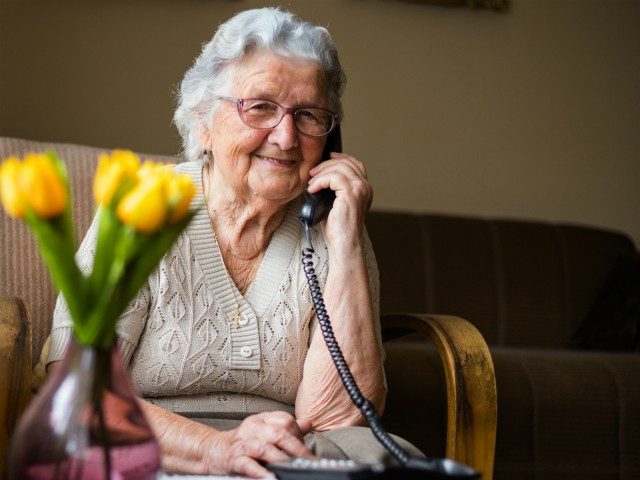Supermarkets are opening early in countries such as the United Kingdom, Ireland, and Australia so that senior citizens or those with disabilities can avoid coronavirus panic shopping.
Since the arrival of the China-origin COVID-19 to Europe, British shoppers, fearing shortages, closures, and quarantines, have been stockpiling on essentials across the country. Supermarkets are working with suppliers and delivery services to increase production and delivery to respond to the demand, but shelves normally holding pasta, rice, UHT milk, or toilet paper are often empty by the middle of the day.
In a bid to ensure that the more vulnerable people in our society are not left wanting and can shop in safety, British budget supermarket chain Iceland has announced some of its stores will open an hour early exclusively for senior citizens and those with disabilities. While not company policy, managers at a local level have decided to respond to their communities’ needs and open their stores early where needed.
“We just want to make sure the experience is as stress-free as possible,” Danny Burke, the manager for Iceland in West Belfast, Northern Ireland, told the BBC, with other Iceland stores are opening early in the south-east and north of England.
A huge thank you to @AldiUK for their generous donation.
This money will help us continue to provide vital information, advice and services to vulnerable older people at this difficult time. 💜 https://t.co/J3kE6QIDPS
— Age UK (@age_uk) March 17, 2020
In the Republic of Ireland, Lidl and Tesco store managers are also looking out for their community by offering priority shopping for seniors, over 65s, and carers. All 163 Lidls across Ireland will offer “priority shopping” for these groups from 9 am to 11 am every day, which will include “prioritised queuing and additional assistance for our older customers”. All of Tesco’s 151 stores will be open an hour early for seniors on Mondays, Wednesdays, and Fridays.
Australian supermarket chain Woolworths has introduced a special “elderly hour” for its senior customers whilst another chain, Coles, is set to introduce a similar scheme. Many older Aussies had told the BBC that they found it difficult to get supplies, with Australians similarly stockpiling. “Today, there was plenty of food on the shelves,” one shopper told the broadcaster, whilst another noted how well organised and friendly all the staff had been.
However, mobility for seniors has recently become more difficult after British Prime Minister Boris Johnson announced on Monday that in order to protect seniors, who are more at risk from coronavirus, they should self-isolate for 12 weeks as a precautionary measure. Health minister Matt Hancock had said on Sunday that seniors may be asked to self-isolate for up to four months even if they have no symptoms.
Now more than ever, every little helps pic.twitter.com/SrFsY2ZuIp
— Tesco Ireland (@TescoIrl) March 16, 2020
How to ensure seniors can still buy groceries may be solved thanks to new technology. Media revealed that government ministers are in talks with food app delivery services Deliveroo, JustEat, and Uber Eats on plans to deliver care packages to seniors and particularly how to provide the service for older people who may struggle using apps.
A Deliveroo spokesman told Sky News on Monday: “Our riders are part of their local communities up and down the country and we know they will want to help support people, particularly the most vulnerable.”
Keeping isolated seniors fed is not enough, however, with older Britons at risk of loneliness and experiencing mental health issues due to months of isolation. Volunteers have been self-organising and developing support networks across the country.
Therapists in Oxford have set up telephone and Skype services for seniors in need of emotional support and advice. A Shropshire medical centre is organising volunteers for grocery pick-ups, while a charity in Cornwall is coordinating helpers for those elderly who have no family. Wales’s Local Government Association is looking to recruit an “army” of volunteers to ensure that Welsh seniors are not forgotten and that there are people on hand to offer emotional and practical support.
We're at 400 #MutualAidCV groups!! Head to our website to find out how you can join or start a group + lots of useful resources. https://t.co/gFwt0wlEcz
Here's @kwalkeronline on @talkRADIO talking about the website + how communities are stepping up across the UK #MutualAidCV pic.twitter.com/WbbUomL51J
— Covid-19 Mutual Aid UK (@CovidAidUK) March 15, 2020
A Kent volunteering group set up to support the elderly and vulnerable in their community have been overwhelmed with the offers of support, with a group founder telling KentOnline: “The response has been amazing with people… jumping at the chance to help others in their local neighbourhood.”
While a Cornwall woman has created a postcard template — which can be printed and filled out — for neighbours and volunteers to use to reach out to those who are self-isolating in their homes. The heading of the postcard reads, “Hello! If you are self-isolating, I can help” and includes sections prompting the volunteer to share their name, number, and offers of help, such as picking up groceries, posting mail, or even just offering “a friendly phone call”.
The post card’s creator Becky Wass wrote on Facebook: “I’ve been feeling pretty helpless watching the news. Maybe you have too? I wanted to do something about it, so I’ve made a postcard that I’ll be posting to my older neighbours as this progresses (after washing my hands!).
“If just one person feels less lonely or isolated when faced with this pandemic, then I’ll feel better about it (I hope!)
“Coronavirus is scary. Let’s make kindness go viral.”

COMMENTS
Please let us know if you're having issues with commenting.